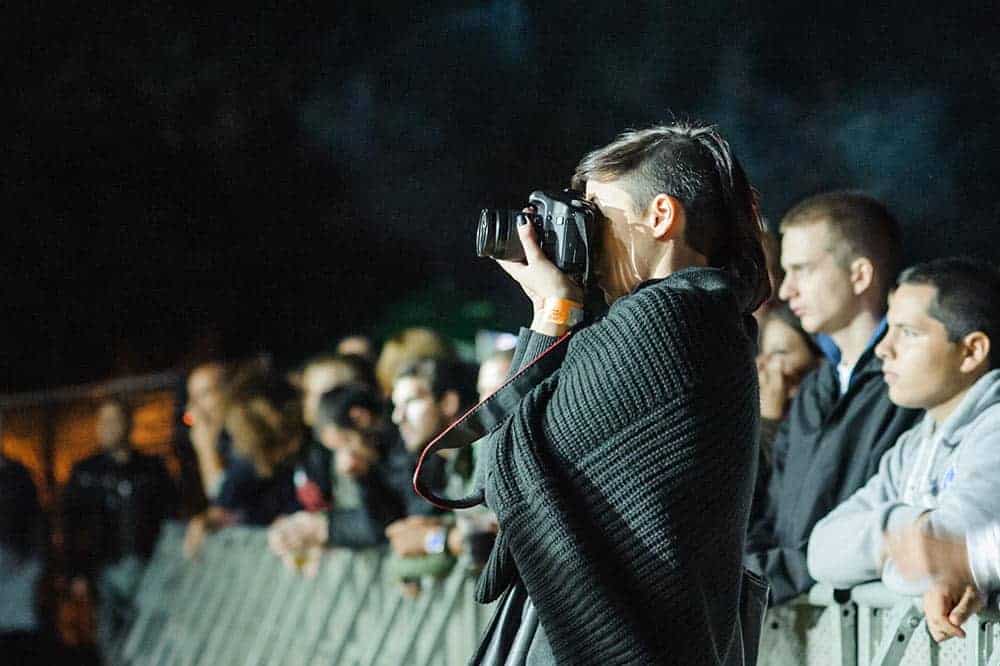Music Career Finder
Survey Start
Music Photographer

How To Become a Music Photographer
- Career Description
- Salary
- Career Outlook
- Career Path
- Experience & Skills
- Education & Training
- Additional Resources
- Sources
- References
Career Description
Music Photographers shoot live concerts, band promo photos and portraits of Musicians for use by media outlets or the bands themselves. They also edit their photos. Although some venues do have House Photographers, the majority are freelancers who have been hired by the venue, band, or media outlet, or who will shop their work around to the media.
Since it can be difficult to generate sustainable income solely from music photography, many Photographers also provide other services such as wedding photography, product photography, etc. or hold a day job unrelated to photography.
Los Angeles-based Concert Photographer Scott Dudelson says, “Every day before a shoot is different. The type of preparation depends on the type of shoot I’m doing. For example, if I am planning to shoot a live performance, I may do some advance research and look at photos from other shows to get an orientation of the types of light being used and the stage set up.
“If I am doing a backstage or set up photoshoot I may spend some time researching the personality of the Artist. At the end of the day, my main job duty is to get ‘the shot.’”
He adds, “I work with a number of different people in the ecosystem, but the three most important gatekeepers are the Manager of the band, Publicist of the band, Promoter of the club or even Celebrity Bodyguard. These are the people who can provide you with the credentials you need to shoot bands.”
Salary
On average, Music Photographers earn approximately $44,500 per year. The salary range for Music Photographers runs from $12,000 to $105,000.
Earnings vary based on the position held. As mentioned, the majority of Music Photographers are freelance, and their pay is based on how many of their photos they are able to license or on a project-by-project basis (if hired to cover a certain concert, for example). Some work on assignment for online or print media and receive a regular salary.
A much smaller salaried group finds work as a House Photographer for a venue, Promoter, or Artist. Another small group of Photographers works for wire services such as Getty Images; these Photographers are paid when others license their images.
Hey, what do you think about trying our new Music Career HelperMusic Career Helper really quick? It’s totally free and could help get your career moving fast! Give it a try. It’s totally free and you have nothing to lose.
Career Outlook
“Concert photography is not an easy field to make a living in, but the Photographers who do this work full-time, often working 5-6 nights a week. It’s a tough lifestyle because often you are shooting late at night and then need to go home and edit the photos so you can submit them to your Editor,” Dudelson says.
Career Path
Most Music Photographers start out as Interns or by contributing photos to blogs for free, so advancement would come in the form of getting paid more money per shot or event. Advancement would also mean establishing a name and reputation as a talented and in-demand Photographer.
Since the majority of Photographers are freelance, getting hired as a regular Photographer for a venue or publication could also represent a step forward. “Concert photography is not an easy business to make a living in, “Dudelson says. “There is no set amount [of] what someone can make; as far as I’m concerned if you’re savvy, creative and adaptable then the sky is the limit.”
“Early in my career I was writing for a number of music magazines,” Dudelson explains. “Through this experience, I was able to obtain photo passes and grew to love taking pictures more than writing. And that kicked off my career in concert photography….”
His advice is simple. “Simply find a show at a local club that allows you to bring your camera and shoot it! Get good at it, build a portfolio which you can promote online or via Instagram, and once you have this you can start soliciting music outlets to publish your future work.”
- “Identify a DSLR that is right for you.
- Identify local clubs that allow you to take a camera into it.
- Identify bands that are playing said club that you want to shoot.
- Get a ticket, go to the show and shoot it.
- Repeat and build an online portfolio.
- Pitch yourself to websites and magazines as a Concert Photographer via portfolio.”
Experience & Skills
“I do not think there are any special skills needed outside of being creative and passionate about both live music and photography,” Dudelson says. “Most of the Concert Photographers I know do not have formal photography training – they are just passionate music lovers with a keen eye and a love of photography!”
Simply having experience and a portfolio as a Music Photographer is important if one is hoping to get hired by an established, well-known media outlet or venue. The ability to meet deadlines, edit photos, and network with Journalists and Editors is also essential.
Skills common to most established Music Photographers are:
- Understanding how to work a professional or semi-pro camera. This includes shooting in Manual mode and understanding light and exposure.
- Learning to work with the light that exists in the live environment.
- Knowing which lenses and gear are ideal for each shooting environment.
- Knowledge of Adobe Photoshop and standard editing.
- Functional use of photo management software such as Adobe Lightroom.
A Music Photographer should be adaptable, inasmuch that their schedule will include many late nights and some uncertainty as to income. But, most of all, Dudelson says, a Music Photographer must be “simply: someone who loves music and photography. If you’ve got that as a foundation then there is no reason to not try shooting bands to see if you enjoy it.”
Education & Training
Although many Music Photographers have attended photography classes or pursued photography majors in college, just as many don’t have any formal training and simply learned photography through experience. Dudelson says, “I don’t think you need any training. I didn’t have any. You only need a good camera and time in the field developing your eye and craft.“
Additional Resources
“There are some good online communities in Reddit and Facebook with Concert Photographers active,” Dudelson says. “I am not part of any professional groups or associations and I have not felt it has hindered my progress in the field. But with that said, in order to move forward in this field, you need to be a good networker. “
He recommends the Music Photographers Facebook group, which is very active.
Sources

Scott Dudelson
Scott Dudelson is a contributing Live Concert and Music Photo Journalist with Getty Images, as well as an internet entrepreneur. Dudelson’s concert photography has been featured by CBS KCAL 9, Rolling Stone, Billboard, KROQ.com, LA Times, AOL/Spinner.com, Flavorpill, Classic Rock Magazine, Music Connection, Buzzbands.la, and Jambase.com. He has shot an incredibly wide range of artists, including the Flaming Lips, 50 Cent, Amy Winehouse, Bob Dylan, and Crystal Castles.
References
- 1Multiple. "Music Photographer Salary". ZipRecuiter. published: Dec 10, 2019. retrieved on: Dec 17, 2019